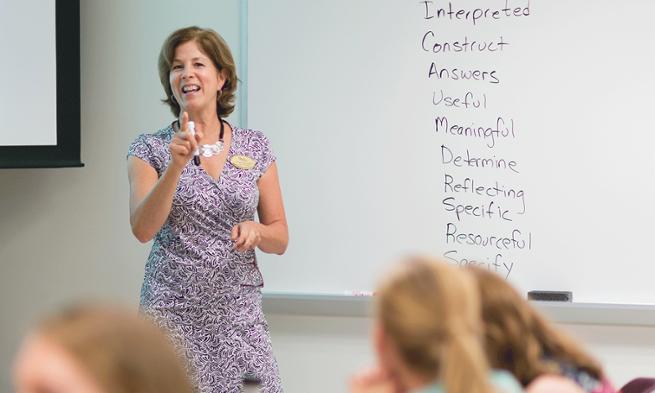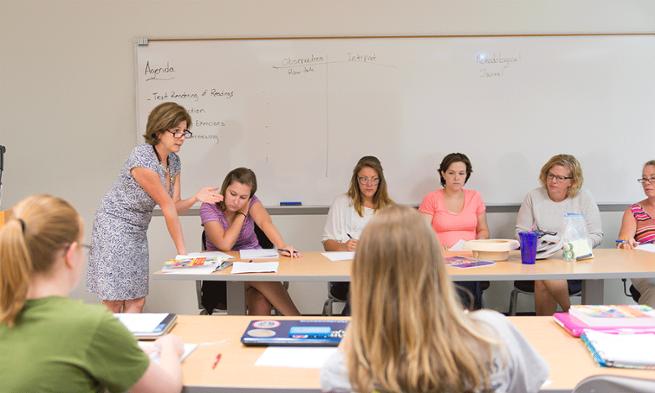The ethics of learning
Education
What does it mean to do the right thing in the classroom?
By Janet L. Smith ('81)
Holly McCartney has been named a Madison Fellow for the The Madison Collaborative: Ethical Reasoning in Action. A professor of early, elementary and reading education, McCartney was granted education leave for the spring 2014 semester to research What does it mean to 'Do The Right Thing' as an early childhood or elementary teacher? McCartney conducted focus group sessions, one-on-one interviews and an open-ended survey with educators in Virginia. She shares some preliminary findings from her continuing research, which stems from a former graduate student's question on how prevalent is awareness of the National Association for the Education of Young Children Code of Ethical Conduct. Prior to joining the JMU faculty, McCartney was a preschool teacher working with ESL and at-risk families and children. Now, she serves as coordinator of the JMU Master of Arts in Teaching degree program in early childhood.
In the following interview Janet Smith ('81) asks McCartney about her research.
Madison: What do your initial research findings show?
Holly McCartney: I focused on determining what the typical ethical dilemmas are that teachers encounter in the classroom, with colleagues and parents.
My research aims to get the stories out of the data, and in classroom research that is very appropriate. That is also aligned with how we prepare our graduate students at JMU. We have a course in inquiry, where they learn this type of methodology so when they have a question in their own classrooms they have the tools to find an answer.
In the focus groups and the survey, we asked "How did your undergraduate or graduate program of study prepare you to handle ethical dilemmas?" The majority of them, unless they were recent graduates, did not remember reading the National Association for the Education of Young Children code of ethical conduct. But they did remember talking about ethical dilemmas throughout many of their courses.
What I think is interesting is that so many of them don't really believe that a code is helpful on its own. When you go back and look in the literature, it confirms that finding, that the code is just a document that rests on a shelf in my teacher handbook. That tells me, if we're going to use the code and have it embedded in our courses, we need to teach and practice using it. Here's how it can help you. Probably the best way to do that is by using some case studies and actual examples and work through them with critical reflection and dialogue.
'[A common scenario for teachers is] sharing difficult information with parents about their child. How do you tell the truth when the truth hurts?"
Madison: What are the common themes or scenarios reported by teachers?
McCartney: How to handle internal gossip about families of students. Teachers concerned about a student's behavior in the classroom ask other teachers, "What can you tell me about the child's home situation?" How teachers answer this question is important.
Sharing difficult information with parents about their child. How do you tell the truth when the truth hurts? You have to choose your words carefully, such as, "This is what I have observed and here is the evidence I have collected to support my observation."
When parents want to know about perceived fairness situations, such as rewarding a child for doing his homework. Most teachers can explain that really well to other children: "Everybody gets what they need and everybody doesn't need the same thing. For this child, they need something more concrete and you've already got it. You're good to go." But dealing with parents can be tricky.

'As teachers, we really are in a position of power and it is so important that we act in ethical ways.'
Madison: What about standardized testing?
McCartney: None of the teachers I talked to went to school to learn how to test students, and today, that is what many of them feel they are doing more than teaching and helping students to learn.
Madison: What are major lessons your research confirms?
McCartney: Having a supportive administration is critical to working through ethical dilemmas. As teachers, we really are in a position of power and it is so important that we act in ethical ways. Even when we are acting in ethical ways, if we feel like others aren't, then we have the dilemma of do I report this other teacher?
Madison: What's ahead in your ethics study?
McCartney: In addition to more work on my qualitative survey results from this project, I'm preparing to present at the European Early Childhood Research Conference and the NAEYC annual conference. The Madison Collaborative: Ethical Reasoning in Action has selected me as a Madison Fellow to work with JMU faculty who want to integrate ethical reasoning into their existing courses. This has become my new focus for next year.
Learn more about the Madison Experience.
